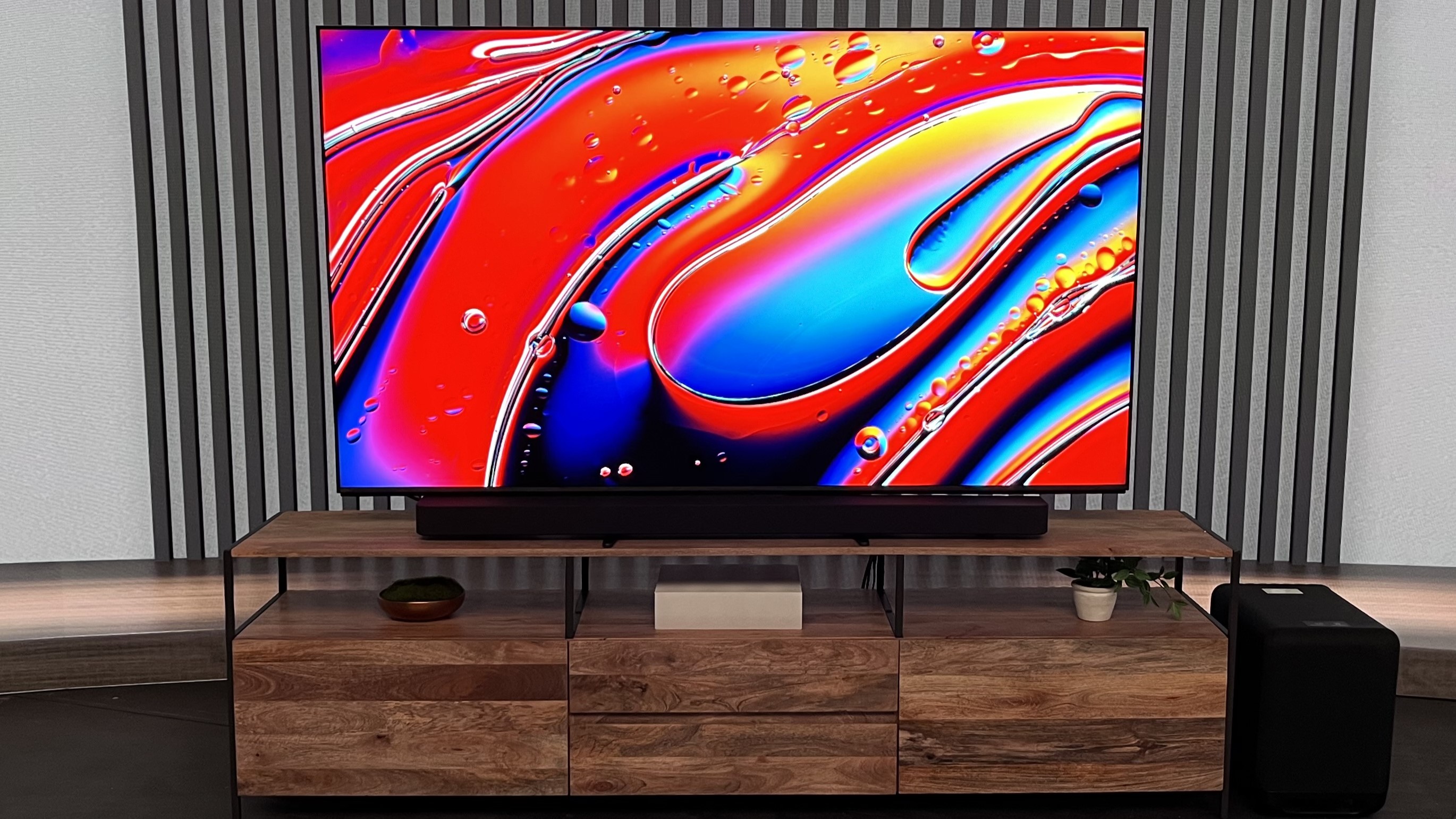Sony made a special occasion of its 2024 TV launch, holding it at the Sony Pictures Studios lot in Los Angeles. At the event, attendees, myself included, were treated to demos of Foley effects and soundtrack mixing, plus other striking examples of behind-the-scenes movie magic that happens at the studio. Sony’s message was that the technology that goes into movie and TV creation via its studio and professional camera and display divisions trickles down into consumer products, and it was made loud and clear at the event.
The Sony Bravia 9 is the flagship model of the new Bravia series TVs, taking that crown from the Sony A95L OLED TV, which will continue in the lineup for 2024. Interestingly, the Bravia 9 is a mini-LED TV. That marks a change in direction for Sony, a brand that in the past had regularly positioned OLED as the most premium technology in its TV lineup.
Sony’s re-positioning of mini-LED at the top of the TV food chain results from two tech developments at the company. The first is the creation of the BVM-HX3110, a professional mastering monitor capable of 4,000 nits peak brightness. The BVM-HX3110 was introduced in late 2023, and replaces the BVM-HX310, a standard model for movie post-production that tops out at 1,000 nits peak brightness.
The second development is XR Backlight Master Drive with High Peak Luminance, a new TV backlight technology used exclusively in the Sony Bravia 9 mini-LED TV. According to Sony, its next-gen backlight tech is responsible for a 50% brightness boost in the Bravia 9 over the company’s previous flagship mini-LED model, the Sony X95L, along with a 325% increase in local dimming zones – something it accomplishes through a new, highly miniaturized 22-bit LED driver.
Along with increasing the number of LED modules that can be positioned in a backlight, the new driver’s higher resolution (other TV makers use 10- or 12-bit drivers, according to Sony) in combination with advanced dimming control algorithms lets it display images with a greater level of refinement than previously available in the best TVs. And that’s where Sony’s demo of the new Bravia 9 TV I attended comes in.
Brightness refined
There were two components to Sony’s demonstration of the Bravia 9’s XR Backlight Master Drive with High Peak Luminance tech. The first was a comparison of the new Sony BVM-HX3110 monitor with the older BVM-HX310 using movie scenes mastered at 4,000 nits peak brightness. While most movies are mastered at 1,000 nits peak brightness, according to Sony that has mainly been a technology limitation – one now removed by the BVM-HX3110. When viewing the 4,000 nits footage on both monitors side by side, a clear increase in highlight detail on the new BVM-HX3110 made images look notably more dynamic.

The second component was a stacked pair of Sony Bravia 9 TVs set alongside a stacked pair of Samsung QN90C TVs, that company’s flagship 2023 mini-LED model in the US. The TVs arrayed at the top had their LCD panels removed so we could see the “raw” mini-LED backlight (see pic at top). Viewing a series of video clips, the Sony’s backlight had notably higher “resolution” owing to the XR Backlight Master Drive’s more granular local dimming performance. It also had a punchier level of brightness that could be seen in images displayed on the normal, non-butchered versions of both TVs located below. That brightness made highlights pop more dramatically and colors look brighter and richer.
Equally impressive in the demo was the virtual absence of backlight blooming effects in the transitions between bright and dark parts of images on the Bravia 9. Backlight blooming is a common visual artifact with LED-based TVs, even ones that use mini-LED tech, and it’s a key reason why OLED TVs, which have panels with self-emissive pixels that generate their own light, have retained a picture quality advantage over LED TVs.
Mini-LED mastered
Another picture quality comparison conducted by Sony at the event put the Bravia 9 alongside the Sony X95L and Samsung S95C, that company’s 2023 flagship QD-OLED model. The comparison also used Sony’s BVM-HX3110 displaying the same images as a reference point, and of the three TVs, the Bravia 9 most closely tracked the picture on the professional mastering monitor.
While Sony hasn’t revealed peak brightness specs for the Bravia 9 TV, its ability to accurately reproduce highlight and shadow details in movies mastered at 4,000 nits makes it a statement piece for HDR. As Sony’s new mastering monitor makes its way into more production facilities and movie directors and cinematographers start pushing the limits of what the format is capable of, any TV that can handle that will have an advantage.
@techradar
♬ Storytelling – Adriel
Sony’s shift to mini-LED for its flagship TV signals its confidence in the tech, and with developments such as XR Backlight Master Drive, its ability to compete effectively with OLED. The 2024 crop of OLED TVs is turning out to be the brightest yet, with the new Samsung S95D measuring just under 1,800 nits peak brightness in our tests. But the new Samsung QN90D mini-LED model is even brighter, topping out at around 2,000 nits.
There’s only so much more that OLED makers can do to increase brightness beyond current levels, and the display tech may have hit its peak in the latest generation of TVs. And while we’ve yet to measure the Bravia 9, mini-LED is capable of higher brightness than OLED tech, and that’s something Sony clearly had in mind when planning its new flagship. In the future, we can expect to see movies with even wider dynamic range, and mini-LED with its high peak brightness capability will be well-positioned to handle it.

